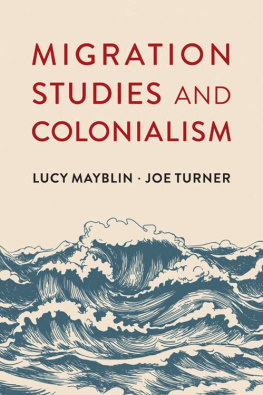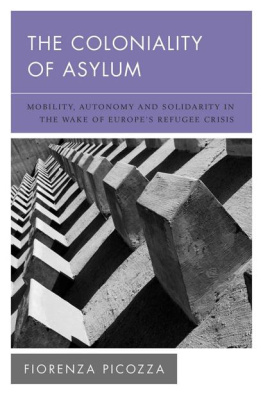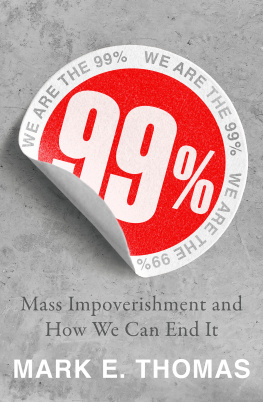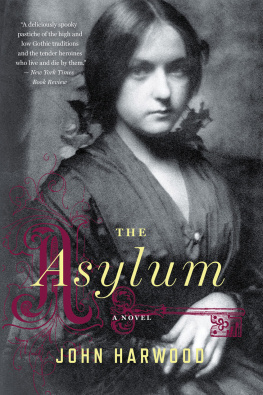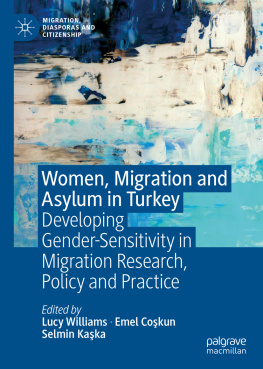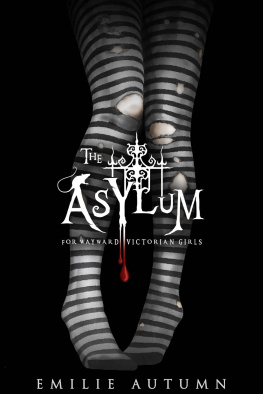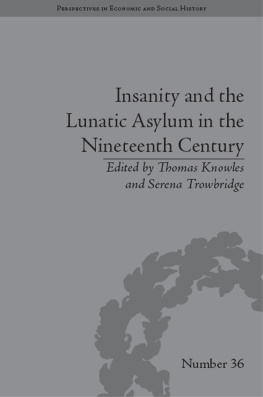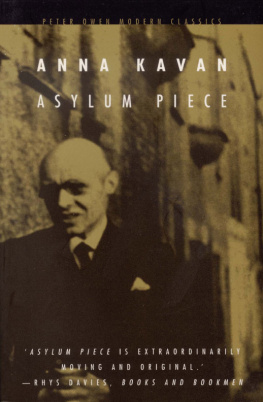
Unlike the slow violence that pervades this book, any reader concerned with social injustice will be moved to devour this searing text at a fast pace. In a theoretically sophisticated and empirically rich account, Lucy Mayblin shines a light on the logics of differential humanity and purposeful impoverishment that lie at the centre of asylum policy in the UK. This book is compelling, insightful, urgent and brilliantly written. I implore you to read it.
Louise Waite, Professor of Human Geography, University of Leeds, UK
Mayblins book is the first to uncover in great detail the ramifications of the UKs policy of asylum seeker impoverishment on the everyday lives of asylum seekers. Introducing the idea of slow violence she unpicks the multiple harms occasioned by the state against asylum seekers and highlights the role of civil society in offering some amelioration of the states actions. This book is essential reading for anyone who cares about refugees and asylum seekers: policymakers, practitioners, academics, students and human rights activists.
Jenny Phillimore, Professor of Migration and Superdiversity and Director of the Institute for Research into Superdiversity, University of Birmingham, UK
Impoverishment and Asylum
Impoverishment and Asylum argues that a shift has taken place in recent decades from construing asylum as primarily a political and/or humanitarian phenomenon, to construing it as primarily an economic phenomenon, and that this shift has led to the purposeful impoverishment, by the state, of people seeking asylum in the UK.
This shift has had far-reaching consequences for people seeking asylum, who have been systematically impoverished as part of the effort to strip out any possibility of an economic pull factor leading to more arrivals, but also for those administering their support system, and for civil society organisations and groups that seek to ameliorate the worst effects of the resulting asylum regimes.
This book argues that within this context asylum support policies in the UK which are meant to help and protect, in fact do serious harm to their recipients. It argues that the shift from construing asylum seekers as economically, rather than politically, motivated migrants across the West, is part of a much broader set of historical and philosophical worldviews than has previously been articulated. The book offers a rigorously researched and richly theorised analysis drawing on postcolonial and decolonial perspectives in making sense of the purposeful impoverishment by the state of a particular group of people, and why this continues to be tolerated in the fourth richest country in the world.
Lucy Mayblin is Senior Lecturer in Sociology at the University of Sheffield. She is the author of numerous publications in the field of refugee and migration studies, including the book Asylum After Empire: Colonial Legacies in the Politics of Asylum Seeking (2017), which won the Philip Abrams Memorial Prize from the British Sociological Association.
Routledge Advances in Sociology
Conflict and the Social Bond
Peace in Modern Societies
Michalis Lianos
Boundaries of European Social Citizenship
EU Citizens Transnational Social Security in Regulations, Discourses and Experiences
Edited by Anna Amelina, Elisabeth Scheibelhofer, Ann Runfors, Emma Carmel
Cultures, Citizenship and Human Rights
Edited by Rosemarie Buikema, Antoine Buyse, Antonius Robben
Regional Cultures, Economies, and Creativity
Innovating Through Place in Australia and Beyond
Edited by Ariella Van Luyn and Eduardo de la Fuente
Care, Power, Information
For the Love of BluesCollarship in the Age of Digital Culture, Bioeconomy, and (Post-)Trumpism
Alexander I. Stingl
The Field of Water Policy
Power and Scarcity in the American Southwest
Franck Poupeau with Brian ONeill, Joan Cortinas Muoz, Murielle Coeurdray and Eliza Benites-Gambirazio
Impoverishment and Asylum
Social Policy as Slow Violence
Lucy Mayblin
For more information about this series, please visit: www.routledge.com/Routledge-Advances-in-Sociology/book-series/SE0511
First published 2020
by Routledge
2 Park Square, Milton Park, Abingdon, Oxon OX14 4RN
and by Routledge
52 Vanderbilt Avenue, New York, NY 10017
Routledge is an imprint of the Taylor & Francis Group, an informa business
2020 Lucy Mayblin
The right of Lucy Mayblin to be identified as author of this work has been asserted by her in accordance with sections 77 and 78 of the Copyright, Designs and Patents Act 1988.
All rights reserved. No part of this book may be reprinted or reproduced or utilised in any form or by any electronic, mechanical, or other means, now known or hereafter invented, including photocopying and recording, or in any information storage or retrieval system, without permission in writing from the publishers.
Trademark notice: Product or corporate names may be trademarks or registered trademarks, and are used only for identification and explanation without intent to infringe.
British Library Cataloguing-in-Publication Data
A catalogue record for this book is available from the British Library
Library of Congress Cataloging-in-Publication Data
Names: Mayblin, Lucy, author.
Title: Impoverishment and asylum : social policy as slow violence /
Lucy Mayblin.
Description: Milton Park, Abingdon, Oxon ; New York, NY :
Routledge, 2020. | Series: Routledge advances in sociology |
Includes bibliographical references and index.
Identifiers: LCCN 2019043323 (print) | LCCN 2019043324
(ebook) | ISBN 9780367423100 (hardback) | ISBN
9780367823450 (ebook)
Subjects: LCSH: RefugeesGreat BritainSocial conditions. |
RefugeesGreat BritainEconomic conditions. | Great
BritainEmigration and immigrationGovernment policy. |
Great BritainEmigration and immigrationPublic opinion.
Classification: LCC HV640.4.G7 M39 2020 (print) | LCC
HV640.4.G7 (ebook) | DDC 362.87/5610941dc23
LC record available at https://lccn.loc.gov/2019043323
LC ebook record available at https://lccn.loc.gov/2019043324
ISBN: 978-0-367-42310-0 (hbk)
ISBN: 978-0-367-82345-0 (ebk)
Typeset in Times New Roman
by Apex CoVanatage, LLC
Dedicated to Ali
The research project that enabled me to undertake the research necessary for this book was generously funded by the UK Economic and Social Research Council, under its Future Research Leaders Scheme. While the funding title implies a single excellent research leader who produces all of the ideas and works completely independently, in fact many people made this project, and book, possible. The project was supported by a team of totally awesome women who formed the advisory board: Louise Waite, Katie Bales, Jenny Phillimore, Lisa Doyle, Alice Bloch, and Hannah Lewis. They were inspiring and supportive in equal measure, despite being extremely busy. Poppy James, Mustafa Wake, and Mohsen Kazemi, as well as another researcher who will remain nameless, all worked directly on the project as research assistants and were fantastic. The European University Institute hosted me (and my family) for three months in 2016. That was a wonderful experience and very fruitful for the project in terms of thinking about the economic rights of people seeking asylum in international comparative perspective; many thanks to Andrew Geddes for helping to set that up, and to all of the lovely people who I met while there. I am very grateful to Rodrigo Edema and Sarah Eldridge at Sheffield City of Sanctuary, to Gina Clayton at ASSIST, to the research team at the British Red Cross in London, to Lucy Smith and Dave Smith at NACCOM, and to Kate Smart at Asylum Welcome for being excellent collaborators and for teaching me so much about the British asylum system and the harms that it wreaks. Thanks also to many colleagues and friends who have supported me in various ways from hiring me to reading draft papers and to reviewing the proposal for this book; in no particular order: John Solomos, Sarah Neal, Gurminder K Bhambra, Joe Turner, Katherine Jenson, and also to Emily Briggs at Routledge. Thanks also, and always, to Christine Booth, Roger Mayblin, and Michael Farrelly for maximum support on the home front that makes everything else possible.



